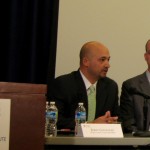
Thousands of New York pharmacies will now accept discount prescription cards. (Photo: Paul Arrington/flickr)
NEW YORK—Non-citizens (both legal and undocumented immigrants) are much more likely to be without health insurance than their U.S. born counterparts. According to the Kaiser Family Foundation, 47 percent of non-citizens are uninsured.
Of course, they still get sick. But when they need to buy medication, they are often without prescription benefits, or have inadequate insurance—and cost is a barrier, or a devastating burden.
That situation may start to improve for the one million New Yorkers—many of them immigrants—without health insurance, and the 300,000 others who don’t have drug benefits on their bare-bone plans. NYCRx, a non-profit organization, and their partner, Financial Marketing Concepts, started issuing a free prescription discount card this week that will offer savings of up to 65 percent on brand-name and generic drugs. Hear this: There are no fees or paperwork, and it’s effective immediately. Anyone can use it at participating pharmacies nationwide—59,000 have already signed on. Most remarkably, it doesn’t matter what your income, health status or age is.
I know, it sounds too good to be true. Anyone can go get lower prices for prescriptions…and it’s free?
What do the pharmacies get out of it?
More customers. “Some people who are uninsured just don’t fill prescriptions. So not only will it drive existing contracts to participating pharamacies, it will actually drive new contracts,” said Sarah Sheffield, executive director of NYCRx.
Here’s an example of the benefits: Simvastatin, a cholesterol-lowering drug, is $14 with the card, and anywhere from $30 to $60 without it. People will also be able to use the card for medications that insurers are increasingly labeling “lifestyle drugs,” like birth control pills.
Sheffield says she was shocked to learn that “if you go to 10 different pharmacies you could get 10 different prices,” i.e. that there are no regulations on how much pharmacies can charge for any given drug. Pharmacies buy at a discounted wholesale price, and then they mark up the retail price however they choose. NYCRx and FMC were able to negotiate the level of mark up with the participating pharmacies.
A 2005 study published in the American Journal of Public Health revealed that when it comes to medication, immigrants spend a staggering 69 percent less on prescription drugs than U.S. born residents. There are many reasons why—not only cost, but language and cultural barriers.
Thanks to New York’s large immigrant population and advocacy efforts, the city’s Language Access in Pharmacies Act went into effect in 2009, which requires chain pharmacies to provide translation and interpretation services for low-English proficiency customers filling prescriptions. State Senator Tom Duane and State Assemblyman Richard Gottfried are behind a new a bill that would standardize prescription labels and make them easier to understand.
Lower prices aren’t going to remove all the barriers to high quality health care for immigrants. “There are lots of reasons why people don’t take medications, but if you can’t afford them, then there’s no chance,” said Sheffield.
The free discount drug cards are being distributed at participating pharmacies, public libraries, and even some restaurants through the New York State Restaurant Association. Organizations and employers can order in bulk, and anyone in New York City can print out their own card at http://www.coast2coastrx.com. I did.




